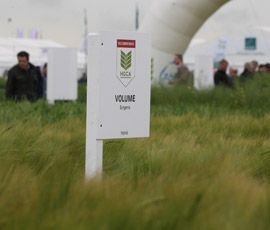Cash back if hybrid barley doesn’t come up trumps

A cash-back guarantee of £60/ha to ensure a half a tonne yield boost from growing hybrid winter barley is to be offered by Syngenta from this autumn.
In an ambitious move to double the area of hybrid barley by 2014, the company is dangling this carrot to give farmers confidence in managing its Hyvido range of hybrid barley varieties.
The cash-back is optional, but comes with several caveats. The yield guarantee of 0.5t/ha over conventional varieties is based on Syngenta’s regional reference sites, not farm performance.
Growers will be required to use the company’s own fungicides and plant growth regulators and they will need to use a specified seed rate and apply nitrogen by a certain timing.
If all those rules are adhered to by the grower and Syngenta’s reference site trials fail to deliver the 0.5t/ha advantage the grower will receive the equivalent of the seed cost back – £60/ha.
The seed trade are cautious about whether this could affect the value of seed, future business arrangements and the practical implications of non-BASIS registered seed representatives selling a package that includes agrochemical advice.
The cash back guarantee
You get a £60/ha refund on Syngenta’s Hyvido hybrid barley varieties if:
- The hybrid barley crop does not generate 0.5t/ha extra yield versus conventional varieties based on Syngenta trials.
- Syngenta’s isopyrazam fungicide (such as Bontima) and the company’s branded trinexapac-ethyl growth regulator (Moddus) are used.
- The seed rate is 200-260/sq m or 70% of conventional rates.
- The first nitrogen is applied by GS 25.
Independent advisors are also concerned that these types of arrangement will undermine their professional credibility.
Hyvido varieties can be grown without signing up to the terms of the guarantee and using independent agronomy programmes.
“There’s no obligation. However, we believe in this technology and the benefits.,” says James Taylor-Alford of Syngenta.
The company’s trials reveal four critical agronomic factors – seed rate, early nitrogen, brown rust control and lodging management – to extract the best from hybrid barley, he says.
The performance of hybrid barley on individual farms is irrelevant, because the guarantee is based on results from a network of reference fields, which will be validated by crop consultants ADAS.
“We will also be providing updates from our reference fields on activities and treatments throughout the season,” adds Mr Taylor-Alford.
Reliable hybrid barley seed supply has been an issue in the past, but he is confident that a four-fold increase in investment to remove bottle necks, extending production across Europe and be less reliant on one specific female line will make a big difference.
The company’s confidence in yield performance comes from the hybrid barley’s ability to produce more ears per sq/m, more grains per ear and a higher thousand grain weight.
However, it does need different management to a conventional variety, which is why the cash-back guarantee builds in specific advice and input usage.
“These hybrid varieties should be grown at a lower seed rate, they need earlier nitrogen to support their vigorous growth and they produce both a larger canopy and more straw, so the risks associated with these factors need managing,” says Mr Taylor-Alford.
Their trials support the use of isopyrazam chemistry (as in Bontima): “It’s the best fit because of its excellent brown rust activity, along with a split application of Moddus, to prevent lodging.”
Terms and costs will be available in June through the seed trade. Hyvido is the new brand for all of Syngenta’s hybrid barley seed technology, with all future varieties carrying this prefix.
| What is a hybrid? |
|---|
The offspring of genetically dissimilar parents is the official definition of a hybrid. In hybrid barley, inbred sterility in the female line allows it to be crossed with male pollen containing the restorer gene, which means that fertility is restored to the seed. The greater performance of the hybrid seed relative to its parents is known as hybrid vigour. This delivers bigger, stronger plants with thicker stems and longer ears. Hyvido is the umbrella brand for all Syngenta hybrid seed technology, which includes Volume, Bamboo and Galation with four more to come. |
Opting out of the Recommended List
Syngenta is moving its hybrid barleys out of the HGCA Recommended List. Volume will be the last of the Hyvido varieties to go through this system, confirms the company’s Charlie Siggs.
Future varieties will complete National Listing, which is a legal requirement, but won’t be taken through to the Recommended List trialling system, because the current system doesn’t allow the hybrids to express their true potential.
“They need different management and there isn’t enough flexibility for this to happen under the current trial arrangements,” Mr Siggs says.
Data on new varieties – of which there are four undergoing National List trials – will be produced by Syngenta and trials organisations, so that there is sufficient information on their characteristics and a method of comparing them with alternatives.
Is this yield guarantee a welcome addition and how could it affect your business? Share your thoughts on our hybrid barley forum or by emailing arable editor Richard Allison at richard.allison@rbi.co.uk

